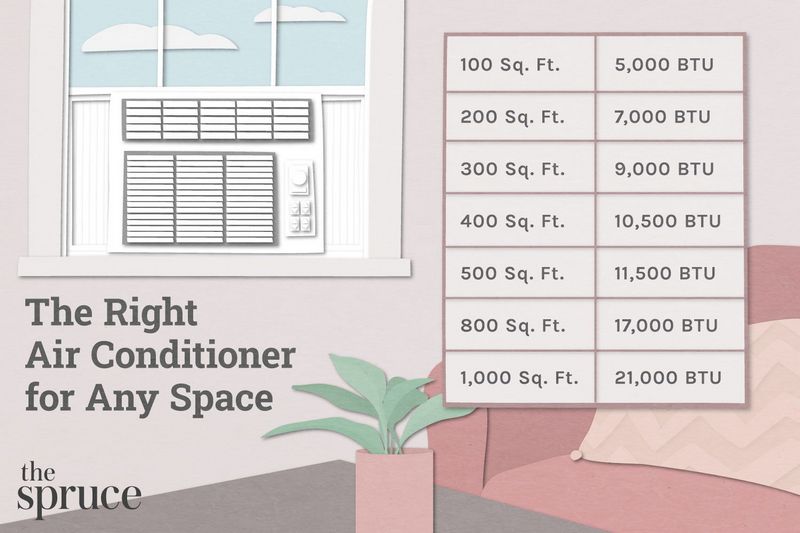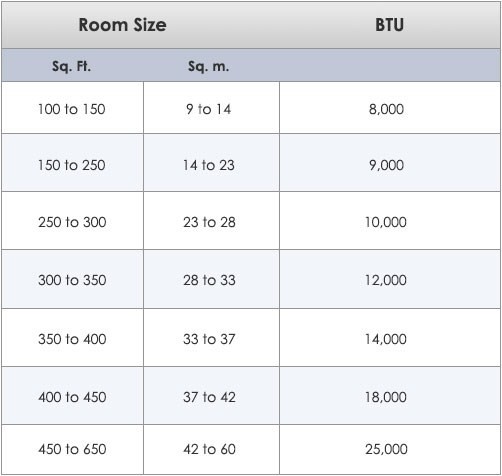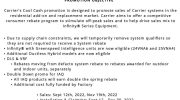
What Size AC Unit Do I Need?
Choosing the right size air conditioner for your home or office is essential to ensure optimal cooling and energy efficiency. It can be overwhelming to navigate through the various options available and determine what size AC unit you need. However, understanding the factors that affect AC unit sizing can help simplify the decision-making process.
The size of the AC unit needed depends on several factors, including the square footage of the area you want to cool, the ceiling height, insulation, number of windows, and the local climate. A unit that is too small will struggle to cool the space effectively, while one that is too large will cycle on and off frequently, leading to inefficient operation and increased energy costs. Finding the right balance is crucial.
Calculating the correct size AC unit involves taking into account the cooling capacity measured in British thermal units (BTUs) and matching it with the cooling load, which refers to the amount of heat that needs to be removed from the space. A professional HVAC technician can assess these factors and determine the appropriate AC unit size for your specific needs.
By choosing the right size AC unit, you can enjoy a comfortable indoor environment while maximizing energy efficiency and minimizing costs. Taking the time to understand your cooling needs and consulting with an expert will ensure that you make an informed decision when selecting an air conditioner.
Importance of Choosing the Right Air Conditioner Size
Choosing the right size air conditioner is crucial for ensuring optimal cooling performance and energy efficiency in your home or office. AC units come in different sizes, and it’s important to select one that matches the cooling needs of your space.
Size matters: The size of an air conditioner refers to its cooling capacity, which is measured in British Thermal Units (BTUs) per hour. Choosing the right size AC unit is essential because an undersized unit will struggle to cool the space effectively, while an oversized unit will cycle on and off frequently, leading to increased energy consumption and decreased comfort.
Energy efficiency: An air conditioner that is too large for the space it is cooling will not operate efficiently. Oversized units will cool the space quickly, but they will cycle on and off too frequently, which can result in excessive wear and tear on the system and increased energy costs. On the other hand, an undersized unit will have to run continuously to try to cool the space, which also results in inefficient operation and higher energy bills.
Comfort and humidity control: Properly sized air conditioners not only provide efficient cooling but also help control indoor humidity levels. When an AC unit is too large, it cools the space quickly but doesn’t have enough time to remove excess moisture from the air. This can make the space feel damp and uncomfortable. Conversely, an undersized unit may struggle to remove humidity adequately, leading to a clammy and muggy indoor environment.
Longevity of the system: Choosing the right size air conditioner can also affect the longevity and performance of the system. An oversized unit will have to cycle on and off frequently, which can put strain on the compressor and other components. This can lead to premature wear and tear and may result in a shorter lifespan for the unit. On the other hand, an undersized unit running constantly may struggle to keep up with demand, leading to increased strain on the system and potential breakdowns.
To determine the right size AC unit you need, it’s important to consider factors such as the square footage of the space, insulation levels, number of windows, ceiling height, climate, and other factors. Consulting with a professional HVAC technician can help ensure that you choose the right size air conditioner for your specific needs.
In summary, selecting the appropriate size air conditioner is crucial for achieving optimal cooling performance, energy efficiency, and overall comfort. By choosing the right size AC unit, you can ensure that your space remains cool, comfortable, and free from excessive humidity while also extending the lifespan of the system and keeping energy costs in check.
Factors to Consider when Determining Air Conditioner Size
When choosing an air conditioner unit, it is important to consider several factors to ensure that you select the right size for your needs. The size of the unit plays a crucial role in its ability to effectively cool or heat your space. Here are some key factors to consider:
- Room Size: The square footage of the room or area you want to cool is an important factor to consider. A larger room will require a more powerful unit to adequately cool the space. Measure the length and width of the room and multiply them to calculate the square footage.
- Insulation: The level of insulation in your building can affect the cooling efficiency. Well-insulated spaces require less cooling than poorly insulated ones. Consider the quality of insulation in your walls, windows, and doors when determining the size of the unit you need.
- Climate: The climate of your region also plays a role in determining the size of the air conditioner unit you need. Warmer climates require more cooling power, while colder climates may require more heating power.
- Number of Windows: The number of windows in the room can impact the heat gain and loss. Rooms with large windows or multiple windows may require a larger unit to compensate for the increased heat transfer.
- Ceiling Height: The height of the ceiling can affect the cooling or heating capacity needed. Higher ceilings require more cooling power to effectively cool the space.
- Occupancy: The number of people regularly occupying the room can also impact the cooling needs. More people in a room generate more body heat, which may require a larger unit to maintain a comfortable temperature.
By considering these factors, you can determine the appropriate size of the air conditioner unit you need. It is recommended to consult with a professional installer to ensure that you select the right size for your specific requirements.
Understanding BTU: The Unit for Measuring Air Conditioner Size
When it comes to determining the right size AC unit for your needs, it’s important to understand the measurement known as British Thermal Units, or BTUs. BTUs are used to measure the cooling capacity of an air conditioner, and they play a crucial role in determining the size of the unit you need.
But what exactly is a BTU?
BTU stands for British Thermal Unit, and it is a unit of measurement used to quantify the amount of thermal energy required to raise or lower the temperature of one pound of water by one degree Fahrenheit. In the context of air conditioning, it represents the amount of heat energy an air conditioner can remove from a room in one hour.
So, why is understanding BTUs important when choosing the right size AC unit?
Well, the cooling capacity of an air conditioner is directly related to its BTU rating. The higher the BTU rating, the larger the cooling capacity of the unit. Therefore, understanding the BTU rating of an AC unit is crucial in determining whether it is the right size for your needs.
Choosing an AC unit with too low of a BTU rating will result in the unit struggling to cool your space adequately. On the other hand, selecting a unit with too high of a BTU rating can lead to energy waste and increased electricity costs.
So, how do you determine the right BTU rating for your space?
Several factors should be taken into consideration, such as the size of the room, the number of windows, the insulation of the space, and the climate of your area. These factors can affect the cooling requirements of your space and, consequently, the necessary BTU rating.
To get a rough idea of the appropriate BTU rating for your space, you can refer to a BTU chart or use a BTU calculator available online. These tools take into account the dimensions of the room, the number of occupants, and other relevant factors to determine the recommended BTU rating.
Keep in mind that the BTU rating is not the only factor to consider when choosing an AC unit. Other factors, such as energy efficiency, noise level, and maintenance requirements, should also be taken into account.
In conclusion, understanding BTUs and their role in determining the size of the AC unit you need is crucial for a comfortable and efficient cooling experience. By considering factors such as room size, insulation, and climate, you can ensure that your AC unit has the appropriate BTU rating to meet your cooling needs.
Evaluating the Size of Your Space
When it comes to determining what size AC unit you need, the first step is to evaluate the size of your space. This will help you determine the cooling capacity required to properly cool the area.
To accurately evaluate the size of your space, consider the following factors:
- Square footage: Measure the length and width of the room or space where you plan to install the AC unit. Multiply these measurements together to get the square footage of the area.
- Ceiling height: Take into account the height of the ceilings. Higher ceilings may require a larger unit to effectively cool the space.
- Insulation: Consider the insulation of your space. Well-insulated rooms will retain cool air more effectively, while poorly insulated areas may require a larger AC unit to compensate for heat gain.
- Windows and doors: Take note of the number of windows and doors in the space. These openings can contribute to heat gain and loss, so it’s important to factor them into the calculation.
Once you have gathered all the necessary information about the size of your space, you can use a BTU (British Thermal Units) calculator or consult an HVAC professional to determine the appropriate AC unit size. Remember that choosing the right size AC unit will ensure optimal cooling performance and energy efficiency for your space.
Considerations for Climate and Insulation
When determining the size of AC unit you need, it’s important to take into account the climate you live in as well as the insulation of your home. These factors can greatly impact the cooling requirements and efficiency of an air conditioner.
Climate: The climate in which you live plays a significant role in determining the size of AC unit you will need. In hot and humid climates, such as the southern regions of the United States, a larger AC unit may be necessary to effectively cool your home. In more moderate climates, a smaller unit may be sufficient. It’s important to consider both the average temperatures and humidity levels in your area when determining the size of AC unit you need.
Insulation: The level of insulation in your home affects how well it retains cool air generated by the AC unit. Poor insulation can result in air leaks, causing the AC unit to work harder to maintain a desired temperature, and ultimately leading to higher energy bills. On the other hand, a well-insulated home can help to keep cool air inside, allowing the AC unit to operate more efficiently. When choosing the size of AC unit, consider the insulation in your home and evaluate whether any improvements are needed.
Consulting a Professional: Taking into account the climate and insulation of your home can provide a general idea of the size of AC unit you need. However, it’s always best to consult with a professional HVAC technician to ensure accurate sizing. They will consider other factors such as the size of your home, the number of windows and doors, and the layout of your living space, to determine the ideal size of AC unit for your specific needs.
In conclusion, when considering what size AC unit you need, it’s important to factor in the climate you live in, the insulation of your home, and to consult with a professional for accurate sizing. By doing so, you can ensure that your AC unit efficiently cools your home, providing optimal comfort while minimizing energy consumption.
Determining Your Cooling Needs
The size of your air conditioning unit is an important factor to consider when determining your cooling needs. Acquiring the right-sized AC unit will ensure that your space is adequately cooled while preventing energy wastage and unnecessary costs. Here are a few aspects to consider in order to determine the appropriate size of AC unit for your needs:
- Square footage: Calculate the square footage of the area that needs to be cooled. Measure the length and width of each room, and multiply the two numbers to get the square footage. Add up the square footage of all the rooms that will be cooled by the AC unit.
- Insulation: Take into account the quality of insulation in your space. Well-insulated rooms will require less cooling compared to poorly insulated areas.
- Windows and doors: Consider the number and size of windows and doors in your space. These openings can contribute to heat gain and loss, so it’s important to account for them in your calculations.
- Climate: The climate in your region plays a significant role in determining your cooling needs. Hot and humid climates will require a larger unit to effectively cool the space.
- Occupancy: Consider the number of people who will be occupying the space regularly. A higher occupancy level will generate more heat, requiring a larger AC unit.
Once you have considered these factors, you can use a sizing chart or consult with a professional HVAC technician to determine the appropriate size of AC unit for your needs. A unit that is too small will struggle to adequately cool your space, while a unit that is too large will cycle on and off frequently, leading to energy wastage and decreased efficiency. By taking the time to properly assess your cooling needs, you can ensure optimal comfort and energy efficiency.
Factors to Avoid when Choosing Air Conditioner Size
Choosing the right size AC unit for your space is crucial to ensure optimal cooling performance and energy efficiency. However, there are several factors that you should avoid when selecting an air conditioner size:
- Guessing the Size: Guessing the size of the AC unit you need is a common mistake that can result in purchasing an oversized or undersized unit. It is essential to perform accurate calculations based on the square footage of your space.
- Ignoring the Cooling Load: The cooling load is the amount of heat that needs to be removed from your space to maintain a comfortable temperature. Failing to consider the cooling load can lead to choosing an AC unit that struggles to cool your space efficiently.
- Not Considering Climate: The climate in your region affects the cooling requirements. In humid climates, you may need a larger AC unit to handle the additional moisture in the air. Conversely, in dry climates, a smaller unit may be sufficient since the moisture removal is not a significant concern.
- Forgetting about Insulation: Poor insulation can cause air leaks and energy loss. If your space lacks proper insulation, you may need to opt for a larger AC unit to compensate for the heat gain. It is important to insulate your space properly before determining the AC unit size.
- Ignoring the Ductwork: The condition and layout of your ductwork can affect the efficiency and performance of your AC unit. Leaky or improperly sized ductwork can result in energy waste and uneven cooling. Make sure to assess and repair any ductwork issues before selecting the size of your AC unit.
- Neglecting the Room Orientation: The orientation of your rooms can impact the cooling requirements. South-facing rooms receive more sunlight and may require a larger AC unit to combat the additional heat. Consider the orientation of your rooms when determining the AC unit size.
- Disregarding Other Heat Sources: Heat sources such as appliances, electronics, and lighting can contribute to the cooling load of your space. Ignoring these heat sources can lead to a miscalculation of the AC unit size needed. Take into account the heat generated by other sources when choosing the size of your AC unit.
By avoiding these factors and conducting proper calculations, you can select the right size AC unit that will provide efficient cooling and optimal comfort for your space.
Benefits of Choosing the Right Air Conditioner Size
Choosing the right size of air conditioner for your needs is crucial in order to maximize the benefits of your cooling system. Here are some key advantages of selecting the correct AC unit size:
- Efficient Cooling: A properly sized air conditioner will effectively cool your space, providing optimal comfort in the most efficient manner. An oversized unit may cycle on and off too frequently, leading to energy waste and reduced overall comfort. Conversely, an undersized unit will struggle to cool your space adequately, resulting in constant running and increased wear and tear on the system.
- Energy Savings: By choosing the right size AC unit, you can achieve significant energy savings. An appropriately sized unit will operate at its maximum efficiency, consuming less energy and reducing your monthly utility bills. On the other hand, an improperly sized unit will work harder and use more energy, resulting in higher energy costs.
- Extended Lifespan: The lifespan of your AC unit can be greatly influenced by its size. When the unit is correctly sized, it doesn’t have to work as hard to cool your space, which reduces wear and tear on the system and can extend its overall lifespan. With an oversized or undersized unit, the system may have to constantly work at maximum capacity, leading to premature breakdowns and costly repairs.
- Improved Indoor Air Quality: An AC unit that is the right size for your space will effectively remove humidity from the air, helping to improve indoor air quality. When the air is properly dehumidified, it becomes less conducive to the growth of mold, mildew, and dust mites, which can have a negative impact on respiratory health.
- Even Temperatures: A correctly sized AC unit will provide even cooling throughout your space, ensuring that every room or area receives the same level of comfort. An improperly sized unit may struggle to reach certain areas or result in uneven cooling, leading to hot spots and discomfort.
Overall, choosing the right size air conditioner is essential for optimal cooling performance, energy efficiency, and overall comfort in your space. It is recommended to consult with a professional HVAC technician to determine the appropriate size AC unit for your particular needs.
Common Misconceptions about Air Conditioner Sizing
When it comes to choosing the right size air conditioner unit for your home, there are several common misconceptions that people often have. These misconceptions can lead to purchasing an AC unit that is either too large or too small for your space, resulting in inefficient cooling and increased energy costs.
1. Bigger is always better.
One of the most common misconceptions is the belief that a bigger AC unit will provide better cooling. However, an oversized unit can actually lead to inefficient cooling, as it will frequently cycle on and off, not allowing enough time for the unit to dehumidify the air properly.
2. The size of the unit depends solely on square footage.
While square footage is an important factor in determining the size of an AC unit, there are other factors that need to be considered as well, such as ceiling height, insulation, number of windows, and the climate in which you live.
3. A smaller unit will save you money.
While it might be tempting to purchase a smaller AC unit in the hopes of saving money, this can actually end up costing you more in the long run. An undersized unit will have to work harder to cool your space, leading to increased energy consumption and potential breakdowns.
4. Air conditioner size can be estimated by using online calculators.
While online calculators can provide a rough estimate for the size of AC unit you may need, it is always best to consult with a professional HVAC technician who can conduct a proper load calculation to determine the exact size of the unit required for your specific space.
5. It doesn’t matter if the unit is too big or too small.
Having an AC unit that is either too big or too small for your space can lead to various problems, including poor indoor air quality, uneven cooling, increased humidity levels, and higher energy bills.
6. Sizing doesn’t matter for window units.
Even for window units, proper sizing is important. A unit that is too small might not provide adequate cooling, while a unit that is too large may struggle to fit properly in the window or may not be compatible with the electrical system of your home.
In conclusion, it is important to understand that the size of an AC unit is not solely determined by square footage. It is always best to consult with a professional before purchasing an air conditioner to ensure that you choose the right size unit for your specific needs and space.
How to Calculate the Correct AC Unit Size
Choosing the right size air conditioner unit for your needs is essential to ensure optimal cooling in your space. An AC unit that is too small will struggle to cool the area efficiently, while an oversized unit will waste energy and may not adequately dehumidify the space. To calculate the correct AC unit size, you need to consider several factors:
- Room size: Measure the length and width of the room in feet. Multiply these two dimensions to get the square footage.
- Insulation: Determine the level of insulation in the room. Poorly insulated rooms may require a larger unit to compensate for heat transfer.
- Climate: The climate in your region affects the cooling load. Hotter climates require larger AC units to maintain comfortable temperatures.
- Number of occupants: The number of people in the room increases the cooling load. Each person adds about 600 BTUs per hour to the load.
- Size and number of windows: Windows contribute to heat gain. Measure the size of each window and determine the number of windows in the room.
- Heat-generating appliances: Appliances such as refrigerators and ovens produce heat. Consider their size and usage when calculating the cooling load.
Once you have gathered this information, you can use a cooling load calculation formula or consult an HVAC professional to determine the appropriate AC unit size for your needs. Keep in mind that it’s better to err on the side of slightly larger capacity to ensure adequate cooling, especially in hotter climates.
Additionally, AC units are typically rated in British Thermal Units (BTUs), which measure the amount of heat that can be removed from a space. As a general guideline, a standard rule of thumb is to allocate 20 BTUs per square foot for cooling. However, this rule may vary depending on the factors mentioned above.
It’s important to note that a larger AC unit doesn’t necessarily mean better cooling. An oversized unit can lead to short cycling, where the unit turns on and off frequently, causing inefficiency and discomfort. Finding the right balance based on your specific needs is key to achieving optimal cooling and energy efficiency.
In conclusion, calculating the correct AC unit size involves considering factors such as room size, insulation, climate, number of occupants, windows, and heat-generating appliances. By taking these factors into account, you can ensure that your AC unit is appropriately sized for your cooling needs and provides efficient and comfortable cooling for your space.

Consulting with a Professional for Accurate Sizing
When determining the size of the air conditioning unit you need, it is important to consult with a professional. While it may be tempting to rely on estimates and calculations found online, a professional can provide accurate sizing based on a variety of factors specific to your home or commercial space.
A professional HVAC technician will take into account the square footage of the space you need to cool, as well as other factors such as the number of windows, insulation quality, ceiling height, and even the local climate. These considerations are vital in determining the correct size of the AC unit.
While you might think that a larger AC unit is always better, this is not necessarily the case. An oversized AC unit can lead to inefficient cooling, increased energy consumption, and higher utility bills. Conversely, an undersized unit may struggle to cool the space adequately, leading to discomfort and potential damage to the unit.
Through a thorough evaluation of your space and specific needs, a professional can determine the optimal size of the AC unit you need. They can also advise on additional features or considerations that may enhance the efficiency and effectiveness of the unit.
When consulting with a professional, it is important to ask questions and provide as much information as possible. This will help them accurately assess your needs and make appropriate recommendations. Additionally, be prepared to discuss your budget and any other specific requirements or preferences you may have.
Remember, properly sizing your AC unit is crucial for maintaining a comfortable indoor environment while minimizing energy consumption and operating costs. Trusting a professional for accurate sizing will ensure that you choose the right AC unit for your needs, helping you to stay cool and comfortable all summer long.
Understanding the Energy Efficiency Ratio (EER)
The Energy Efficiency Ratio (EER) is an important factor to consider when determining the size of AC unit you need. The EER measures how efficiently the unit can cool a space based on the amount of energy it consumes. Higher EER ratings indicate better energy efficiency.
When selecting an AC unit, it’s essential to choose one with an appropriate EER for your needs. If the unit is too large and has a high EER, it may consume more energy than necessary, leading to higher operating costs. On the other hand, if the unit is too small and has a low EER, it may struggle to cool the space effectively.
Calculating the optimal EER for your AC unit involves considering factors such as the size of the space you want to cool, the local climate, and your energy efficiency goals. Consulting with a professional HVAC technician can help you determine the ideal EER for your specific circumstances.
To determine the energy efficiency of an AC unit, look for the EER rating on the unit’s Energy Guide label. The EER is expressed as a ratio of cooling output (measured in British Thermal Units, or BTUs) to energy input (measured in watt-hours). The higher the ratio, the more energy-efficient the unit is.
For example, if an AC unit has a cooling output of 10,000 BTUs and consumes 1,000 watts of electricity, the EER would be calculated as follows:
| Cooling Output (BTUs) | Energy Input (watts) | EER |
| 10,000 | 1,000 | 10 |
When comparing different AC units, be sure to consider their EER ratings in relation to their cooling capacities. A unit with a higher EER may be more expensive upfront but can save you money in the long run with lower energy bills.
Ultimately, understanding the Energy Efficiency Ratio (EER) is crucial to selecting the right size AC unit for your space. By considering the EER and working with a knowledgeable HVAC professional, you can ensure that your AC unit provides optimal cooling efficiency while minimizing energy consumption.
Shopping for Air Conditioners based on Size
When shopping for an air conditioner, it is important to consider the size of the unit you need. The right size AC unit is essential for optimal cooling performance and energy efficiency. Here are some tips to help you determine what size AC unit you need:
Assess your cooling needs
Before buying an AC unit, you should assess your cooling needs. Consider the size of the room or area that needs to be cooled. Larger rooms will require a higher BTU (British Thermal Unit) rating to adequately cool the space. Also, consider other factors such as insulation, ceiling height, windows, and the climate of your location.
Calculate the BTU requirements
Once you have assessed your cooling needs, you can use the BTU calculation to determine the appropriate AC unit size. To calculate the BTU requirements, multiply the square footage of the room by the recommended cooling capacity per square foot. For example, if you have a 200 square foot room and the recommended cooling capacity is 20 BTUs per square foot, you will need an AC unit with a BTU rating of 4,000.
Consider energy efficiency
While it may be tempting to buy a larger AC unit to ensure cool air is quickly delivered, it is essential to consider energy efficiency. An oversized AC unit will cool the room too quickly and will not properly dehumidify the air. This can lead to a damp and uncomfortable indoor environment. Additionally, an oversized AC unit will consume more energy and result in higher energy bills. Therefore, it is recommended to choose an AC unit with the appropriate size to maintain energy efficiency.
Consult with a professional
If you are unsure about the size of the AC unit you need, it is advisable to consult with a professional HVAC technician. They can perform a thorough assessment of your cooling needs and recommend the right size AC unit for your specific requirements. A professional can also ensure proper installation and help optimize the performance and efficiency of your air conditioning system.
Conclusion
Shopping for an AC unit based on size is crucial for achieving optimal cooling performance and energy efficiency. By assessing your cooling needs, calculating the BTU requirements, considering energy efficiency, and consulting with a professional, you can make an informed decision and choose the right size AC unit that will help keep you cool and comfortable.
Additional Considerations for Dual-Zone or Multi-Zone Cooling
If you have a larger home or multiple areas that need to be cooled, you may consider using a dual-zone or multi-zone air conditioning system. These systems allow you to have different temperature settings in different areas of your home, providing customized comfort for each zone.
When determining what size AC unit you need for dual-zone or multi-zone cooling, there are a few additional factors to consider:
- Zoning System Requirements: Dual-zone or multi-zone cooling requires the use of a zoning system, which allows you to control the temperature independently in each zone. This system typically consists of dampers, thermostats, and a control panel. Make sure your AC unit is compatible with the zoning system you plan to install.
- BTU Requirements: Determine the appropriate BTU requirements for each zone. Take into account the size of the area, the number of windows, insulation, and other factors that can affect the cooling load. Use a BTU calculator or consult with an HVAC professional to ensure accurate calculations.
- Capacity and Sizing: Consider the capacity and sizing requirements for each zone. You may need a larger AC unit for zones with higher cooling demands and a smaller one for zones with lower cooling demands. Make sure the total capacity of the AC units meets the combined cooling load of all zones.
- Ductwork: Check if your existing ductwork can accommodate a dual-zone or multi-zone system. Additional ductwork or modifications might be needed to ensure proper airflow and distribution of cool air to each zone.
- Energy Efficiency: Look for AC units that offer energy-efficient options, such as variable speed compressors or high SEER (Seasonal Energy Efficiency Ratio) ratings. These features can help reduce energy consumption and lower your cooling costs.
Overall, when considering dual-zone or multi-zone cooling, it’s essential to assess the specific needs of each zone and ensure that your AC unit and zoning system can meet those requirements. Consulting with an HVAC professional can help you determine the best options for your home.
Frequently Asked Questions about Air Conditioner Sizing
Q: What factors determine the appropriate size unit I need for my AC?
A: Several factors need to be considered when determining the size of AC unit you need. These include the square footage of the area you want to cool, the climate in which you live, the number of windows and doors in the space, and the quality of insulation in the building.
Q: Why is it important to choose the right size AC unit?
A: Choosing the right size AC unit is crucial for optimal cooling and energy efficiency. If the unit is too small, it will struggle to cool the space adequately. On the other hand, if the unit is too large, it will cycle on and off frequently, leading to temperature fluctuations and higher energy bills.
Q: How can I determine the appropriate size unit for my AC?
A: It is recommended to consult with a professional HVAC technician who can perform a load calculation. This calculation takes into account all the factors mentioned earlier and helps determine the correct size unit for your specific needs.
Q: Can I use the size of my old AC unit to determine the size of the new one?
A: While the size of your old AC unit can provide some guidance, it is not the only factor to consider. Changes in technology and improvements in efficiency may mean that a different size unit is now more suitable for your space.
Q: Are there any general guidelines for AC unit sizing?
A: There are some general rules of thumb, such as 20 BTUs per square foot for cooling and 30 BTUs per square foot for heating. However, these should only be used as a starting point, and a load calculation is still necessary for accurate sizing.
Q: What are the consequences of choosing the wrong size AC unit?
A: Choosing the wrong size AC unit can lead to various problems. If the unit is too small, it will struggle to cool the space, resulting in inadequate comfort. If the unit is too large, it will cycle on and off frequently, causing temperature fluctuations, excess humidity, and higher energy bills.
Q: Can I save money by choosing a smaller AC unit?
A: While a smaller AC unit may have a lower initial cost, it can end up costing you more in the long run. An undersized unit will have to work harder and run longer to cool your space, leading to increased energy consumption and potential breakdowns.
Q: What are the benefits of choosing the right size AC unit?
A: Choosing the right size AC unit ensures optimal cooling efficiency, improved comfort, and lower energy bills. It also helps prolong the lifespan of the unit and reduces the likelihood of costly repairs.
Question-answer:,
How do I calculate the size of AC unit I need for my home?
To calculate the size of AC unit you need for your home, you can use a formula called the “British Thermal Units” (BTU) method. This method takes into account factors such as the square footage of your home, the climate in your area, the number of windows, the insulation, and the number of people in your home. You can also consult with an HVAC professional to get an accurate assessment.
What happens if I choose an AC unit that is too small for my home?
If you choose an AC unit that is too small for your home, it will struggle to cool your space efficiently. The unit will have to work harder and run for longer periods of time, which can lead to high energy bills and increased wear and tear on the unit. Additionally, a small AC unit may not be able to maintain a comfortable temperature in very hot weather.
What happens if I choose an AC unit that is too large for my home?
If you choose an AC unit that is too large for your home, it will cool your space too quickly and turn off before it has a chance to properly dehumidify the air. This can lead to a damp and uncomfortable indoor environment. Additionally, an oversized unit may consume more energy than necessary, resulting in higher energy bills.
Can I use the square footage of my home as the sole factor for determining the size of AC unit I need?
No, the square footage of your home is an important factor, but it should not be the sole factor for determining the size of AC unit you need. Other factors such as climate, insulation, number of windows, and number of people in your home also need to be considered. A professional HVAC technician can help you make an accurate assessment based on these factors.
Are there any other factors I need to consider when choosing the right size AC unit for my home?
Yes, in addition to square footage, climate, insulation, number of windows, and number of people, you should also consider the height of your ceilings and the heat-generating appliances and electronics in your home. These additional factors can affect the cooling load and should be taken into account when determining the size of AC unit you need.
What factors should I consider when choosing the right size air conditioner for my room?
When choosing the right size air conditioner for your room, you should consider factors such as the square footage of the room, the ceiling height, the insulation of the room, the number of windows and doors, and the climate of the area.








